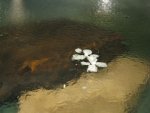Not surprising. Notopthalamus and Taricha have been observed in the wild swimming around under the ice. Their metabolism slooooowwwws doooowwwwn in the cold water and so long as their tissues dont freeze, they survive. Some amphibians get ~50% of their oxygen needs through their skin under normal conditions, let alone when it is cold.
The water that does not freeze is around 4 degrees celcius, not freezing. Moreover, the solute concentration in their tissues drops the freezing point, so their tissues have to be a few degrees below 0 C in order to freeze.
Heck, some reptiles--like american alligators--can survive in air so long as the temp does not drop below 4 degrees. They will keep a hole open for breathing in the ice--if ice is there-- and on warm winter days will come out of the water (which, under the ice is exactly 4 degrees C) to bask. In the middle of winter.
The unfrozen water is 4 C because that is the temperature at which water is the most dense. Unlike a lot of compounds, the density of water does not increase linearly with temperature. Instead it drops in density until the water is 4 C, then as it starts to freeze, density goes back up slightly due to hydrogen bonding. In winter, this means that the water that is below 4 C rises to the top and freezes. Everything else is 4 C, because that water sinks below the ice.





